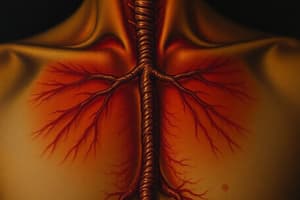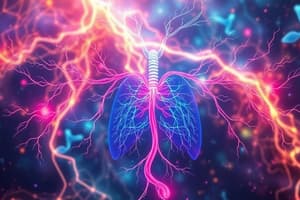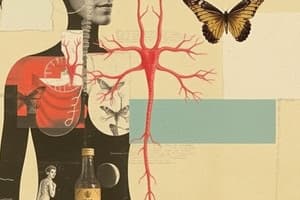Podcast
Questions and Answers
What is the main purpose of the endocrine system in the body?
What is the main purpose of the endocrine system in the body?
- To regulate body temperature
- To control voluntary movements
- To produce nerve signals for body functions
- To maintain homeostasis through hormone release (correct)
Which gland is often referred to as the 'master gland' because it releases many hormones?
Which gland is often referred to as the 'master gland' because it releases many hormones?
- Adrenal gland
- Thyroid gland
- Pituitary gland (correct)
- Pineal gland
What is the function of adrenaline released by the adrenal glands?
What is the function of adrenaline released by the adrenal glands?
- Stimulates egg and sperm production
- Prepares the uterus for fertilized egg implantation
- Triggers the body's 'fight or flight' response (correct)
- Stimulates childbirth contractions
Which hormone is responsible for stimulating milk production in nursing mothers?
Which hormone is responsible for stimulating milk production in nursing mothers?
How do FSH and LH hormones from the pituitary gland affect the reproductive system?
How do FSH and LH hormones from the pituitary gland affect the reproductive system?
What is the main role of estrogen in the female reproductive system?
What is the main role of estrogen in the female reproductive system?
Which hormone plays a crucial role in turning genes on and initiating new processes in the body?
Which hormone plays a crucial role in turning genes on and initiating new processes in the body?
'Corpus luteum' cells in the ovaries release which hormone to stimulate the body supply to the lining of the uterus?
'Corpus luteum' cells in the ovaries release which hormone to stimulate the body supply to the lining of the uterus?
'Fight or flight' response in stressful situations is primarily triggered by which hormone?
'Fight or flight' response in stressful situations is primarily triggered by which hormone?
What is oxytocin's primary role among these options?
What is oxytocin's primary role among these options?
Study Notes
Homeostasis and the Endocrine System
- Homeostasis: the process of maintaining internal balance in the body, also known as "dynamic equilibrium"
- Importance of homeostasis: the body must keep internal conditions stable even if the environment changes
- Examples of homeostasis: body temperature regulation in humans (shivering in cold, sweating in heat) and lizards (basking in sun, hiding in shade)
The Nervous and Endocrine Systems
- Nervous system: uses nerve signals to control body functions
- Endocrine system: uses chemical signals (hormones) to control body functions
- Why hormones are needed: to facilitate communication between different parts of the body, coordinating the whole body and maintaining homeostasis
Hormones and Glands
- Hormones: chemical signals released by glands into the bloodstream, causing changes in other parts of the body
- Types of hormones: growth hormones, sex hormones, response hormones, metabolism hormones
- Glands that produce hormones: pineal (melatonin), pituitary (many hormones), thyroid (thyroxine), adrenal (adrenaline), pancreas (insulin, glucagon), ovary (estrogen), testes (testosterone)
Responding to Hormones
- Lock and key system: hormones fit into receptors on "target" cells, causing changes in the cell
Regulation of Body Functions
- Large scale body changes: hormones can turn genes on, starting new processes in the body by activating dormant genes
- Pituitary gland hormones: stimulate sex and reproductive hormones, leading to growth and development
Sex and Reproductive Hormones
- Sex hormones: testosterone (testes), estrogen (ovaries), regulating sex characteristics and reproductive processes
- Reproductive hormones: FSH (follicle stimulating hormone), LH (luteinizing hormone), oxytocin, prolactin, controlling the menstrual cycle and reproductive processes
Menstrual Cycle
- Controlled by the interaction of 4 hormones: FSH, LH, estrogen, and progesterone
- FSH and LH: released from the pituitary gland, stimulating egg development and hormone release
- Estrogen: released from ovary cells, stimulating growth of the uterine lining
- Progesterone: released from the "corpus luteum" in ovaries, stimulating body supply to the uterine lining
Studying That Suits You
Use AI to generate personalized quizzes and flashcards to suit your learning preferences.
Description
Learn about the endocrine system and how it helps in maintaining homeostasis in the body. Understand the role of hormones as chemical signals in controlling various body functions. Explore examples of how different organisms regulate internal conditions to adapt to the environment.




